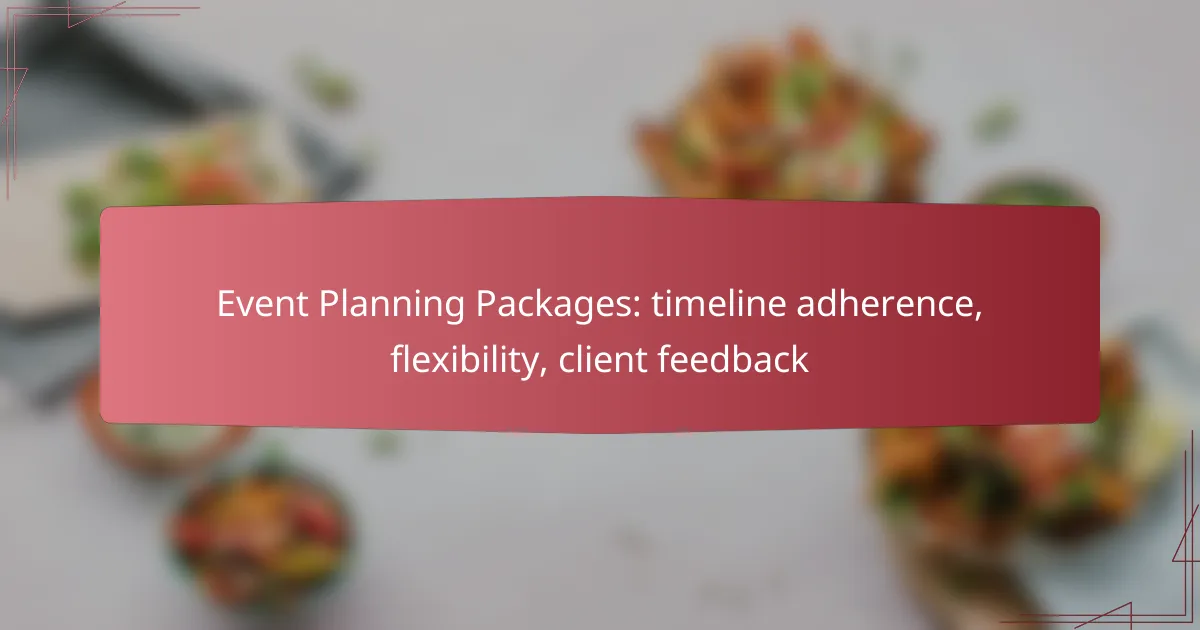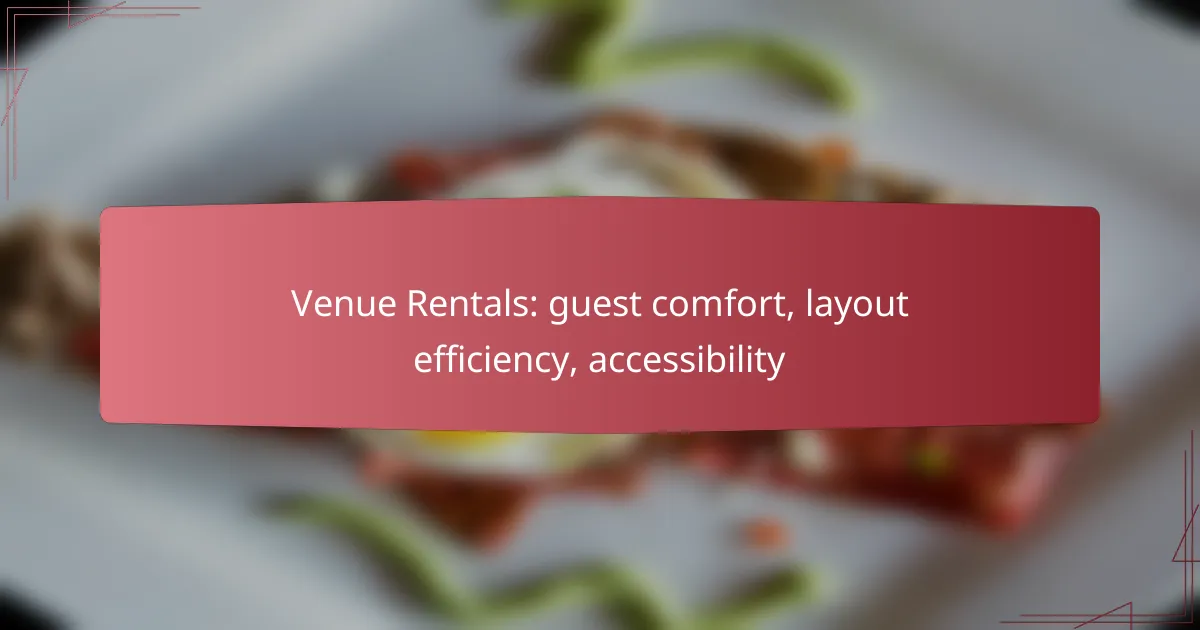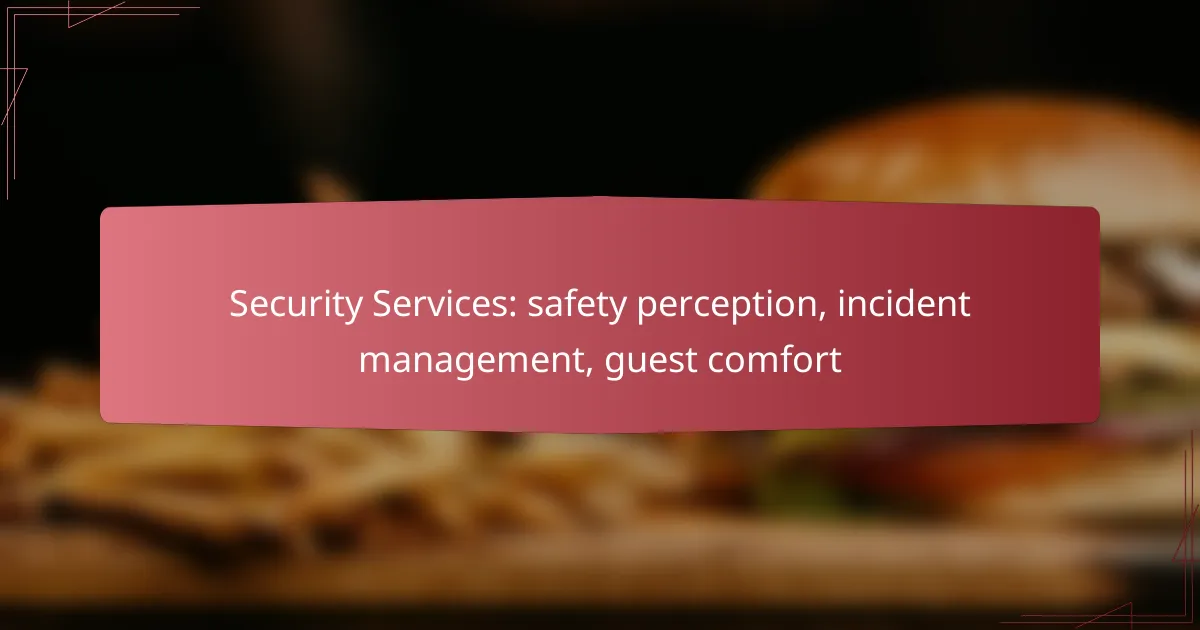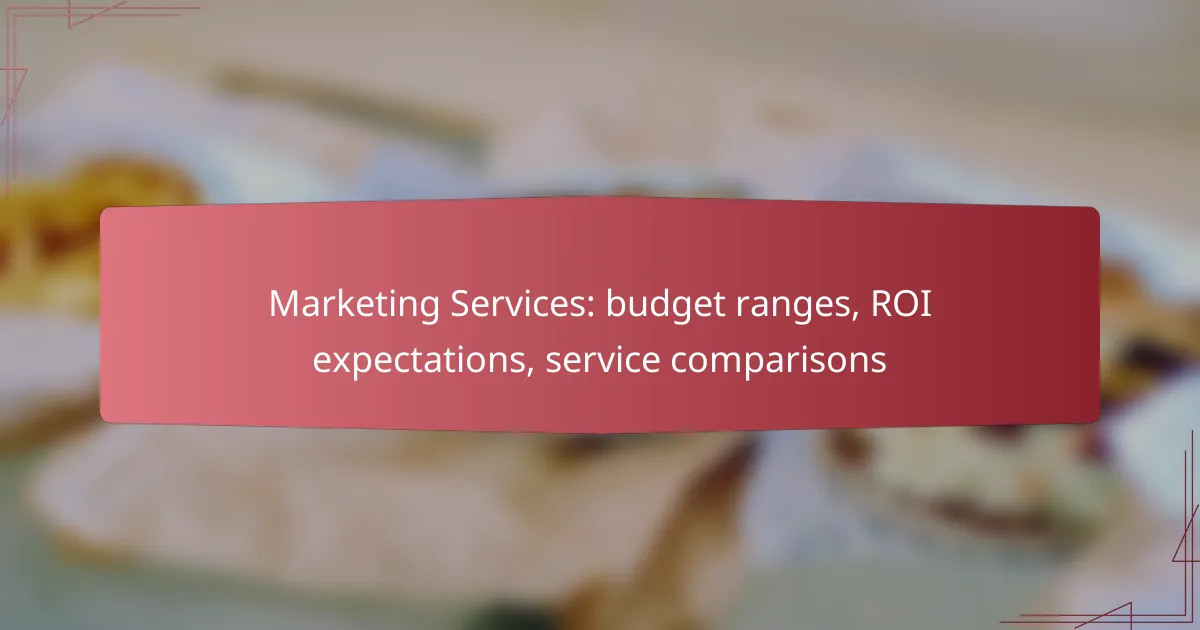Event planning packages are designed to provide a seamless experience by incorporating essential features such as timeline adherence, flexibility, and client feedback. These packages ensure that events run smoothly by establishing clear schedules and allowing for adjustments as needed, while also prioritizing client satisfaction through regular communication and feedback mechanisms.
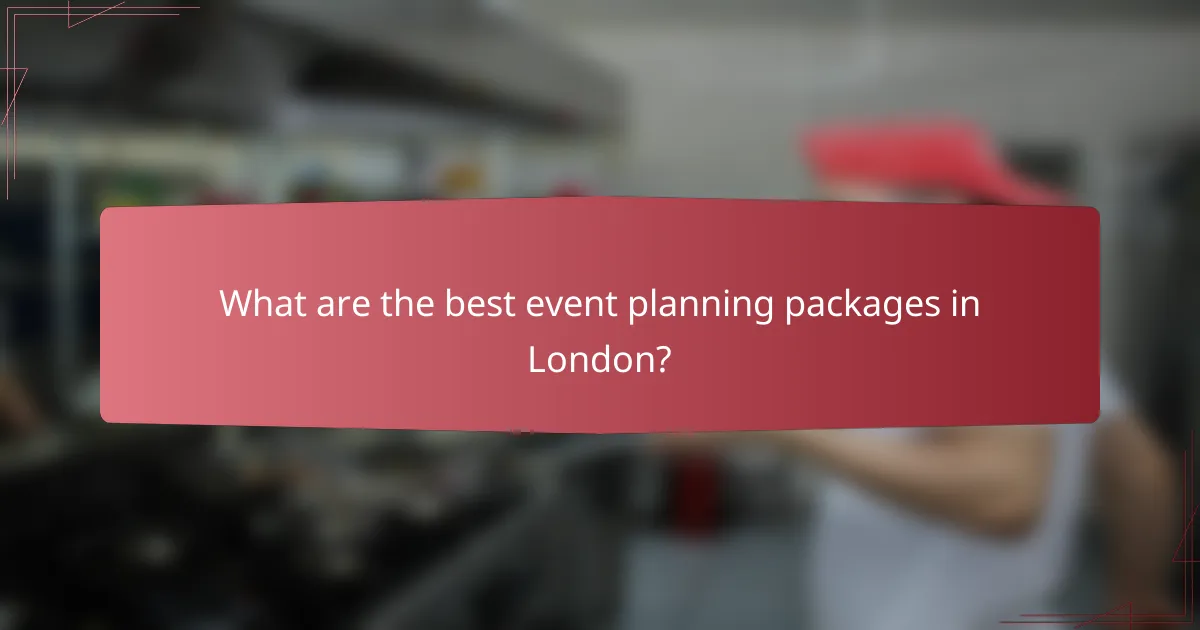
What are the best event planning packages in London?
The best event planning packages in London offer a range of services tailored to different needs, ensuring smooth execution and client satisfaction. These packages typically include features like timeline adherence, flexibility, and mechanisms for client feedback to enhance the planning experience.
Comprehensive package by Eventbrite
Eventbrite’s comprehensive package provides a full suite of tools for event management, including ticketing, promotion, and on-site support. This package is ideal for larger events, offering features like customizable ticket types and real-time analytics to monitor sales and attendance.
Clients can expect a structured timeline with clear milestones, ensuring that every aspect of the event is executed on schedule. Additionally, Eventbrite allows for flexibility in planning, enabling clients to make adjustments as needed based on attendee feedback or changing circumstances.
Customizable options from The Event Company
The Event Company specializes in customizable event planning packages that cater to specific client requirements. Clients can choose from various services, such as venue selection, catering, and entertainment, allowing for a tailored approach that fits their vision and budget.
This flexibility is crucial for adapting to client feedback throughout the planning process. The Event Company encourages ongoing communication, ensuring that any changes or preferences are incorporated seamlessly, which helps in maintaining a positive client experience.
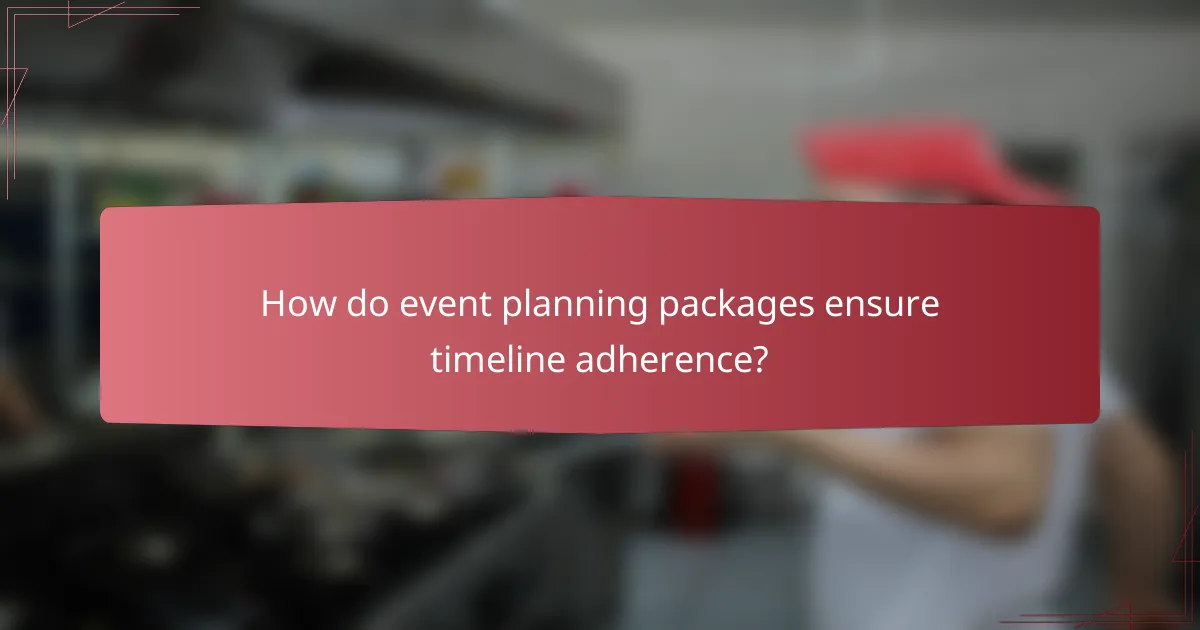
How do event planning packages ensure timeline adherence?
Event planning packages ensure timeline adherence by establishing clear schedules and structured processes. These packages typically include defined milestones, regular updates, and feedback mechanisms to keep all parties aligned and accountable.
Defined milestones and deadlines
Defined milestones and deadlines are critical components of event planning packages. These benchmarks help to break down the overall timeline into manageable segments, allowing for easier tracking of progress. For instance, a wedding planning package may set milestones for venue selection, vendor bookings, and final confirmations, each with specific due dates.
Setting realistic deadlines is essential. Consider using a timeline that spans several months for larger events, while smaller gatherings might require only a few weeks. Always factor in potential delays, such as vendor availability or permit approvals, to ensure a smooth process.
Regular progress updates
Regular progress updates are vital for maintaining timeline adherence in event planning. These updates can take the form of weekly meetings, email summaries, or project management tools that track tasks and deadlines. Consistent communication helps identify any issues early, allowing for timely adjustments.
To maximize effectiveness, establish a routine for updates that suits the event’s scale. For example, larger events might benefit from bi-weekly updates, while smaller ones could suffice with monthly check-ins. Encourage open feedback during these updates to foster collaboration and address concerns promptly.
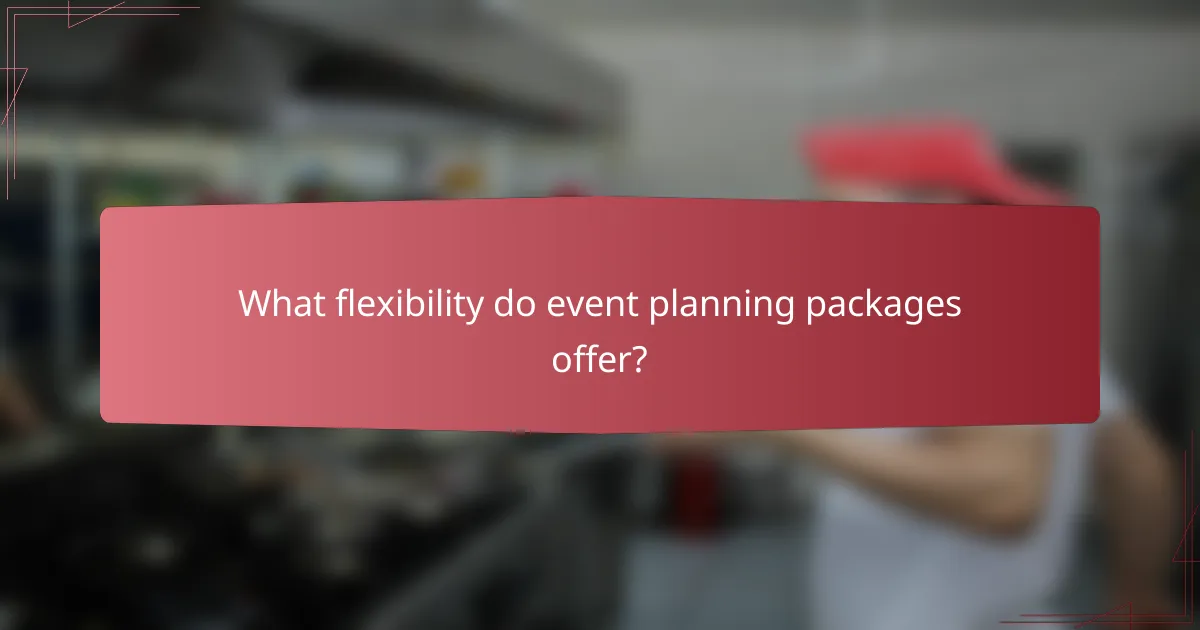
What flexibility do event planning packages offer?
Event planning packages typically offer a range of flexibility options to accommodate varying client needs and preferences. This flexibility can manifest in adjustable service levels and the ability to accommodate last-minute changes, ensuring that events can adapt as circumstances evolve.
Adjustable service levels
Adjustable service levels allow clients to customize their event planning experience based on budget and requirements. For instance, clients can choose from full-service packages that handle every detail to more basic options that provide essential support while allowing for greater personal involvement.
When selecting service levels, consider the scope of your event and the resources available. For example, a corporate event may require comprehensive planning, while a small private gathering might only need minimal assistance. Always clarify what each service level includes to avoid misunderstandings.
Last-minute changes accommodated
Many event planning packages are designed to accommodate last-minute changes, which can be crucial for successful events. This flexibility may include adjusting guest counts, changing venues, or modifying catering options, depending on the package chosen.
To ensure smooth adjustments, communicate any changes as soon as possible. Some planners may charge additional fees for last-minute modifications, so it’s wise to review the terms of your package. Establishing a clear line of communication with your planner can help facilitate these changes effectively.
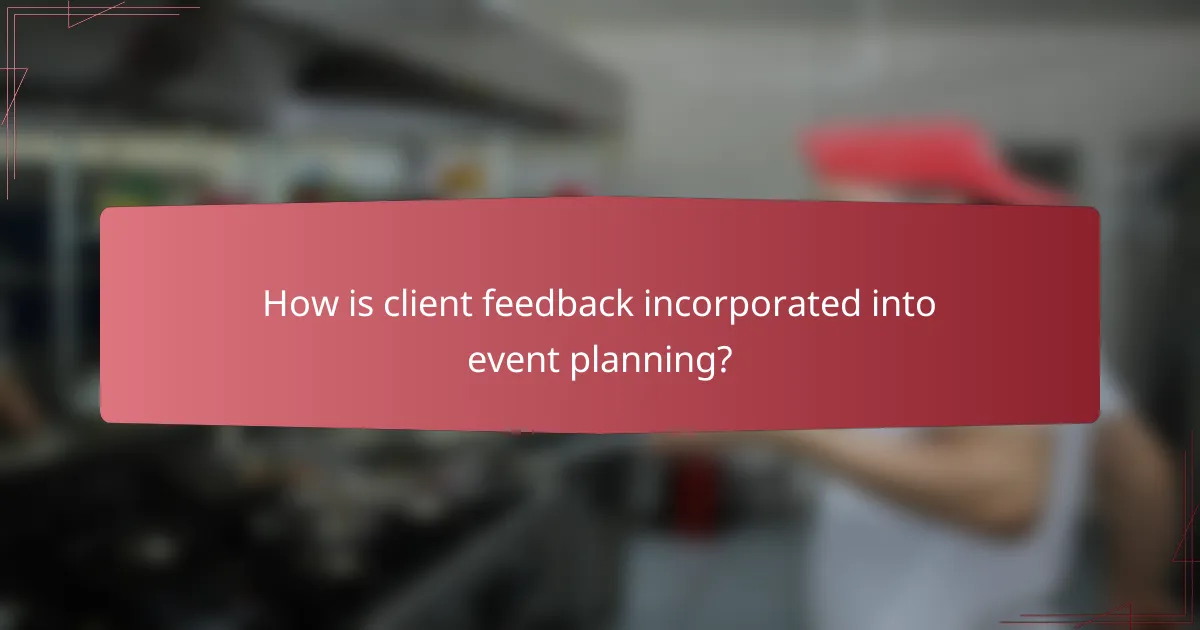
How is client feedback incorporated into event planning?
Client feedback is essential in event planning as it shapes future events and enhances overall satisfaction. By systematically collecting and analyzing feedback, planners can identify strengths and areas for improvement, ensuring that client needs are met effectively.
Post-event surveys
Post-event surveys are a primary tool for gathering client feedback. These surveys typically include questions about various aspects of the event, such as venue selection, catering quality, and overall experience. A well-structured survey can yield valuable insights, often using a mix of rating scales and open-ended questions to capture detailed responses.
To maximize participation, consider sending surveys shortly after the event while the experience is still fresh. Offering incentives, like discounts on future events, can also encourage higher response rates.
Continuous improvement processes
Incorporating client feedback into continuous improvement processes involves regularly reviewing survey results and implementing changes based on the insights gained. This may include adjusting event formats, enhancing service delivery, or refining vendor partnerships. Establishing a feedback loop ensures that lessons learned are applied to future events.
Event planners should schedule regular review meetings to discuss feedback findings and action items. This proactive approach not only improves event quality but also fosters stronger relationships with clients, demonstrating a commitment to their satisfaction and preferences.
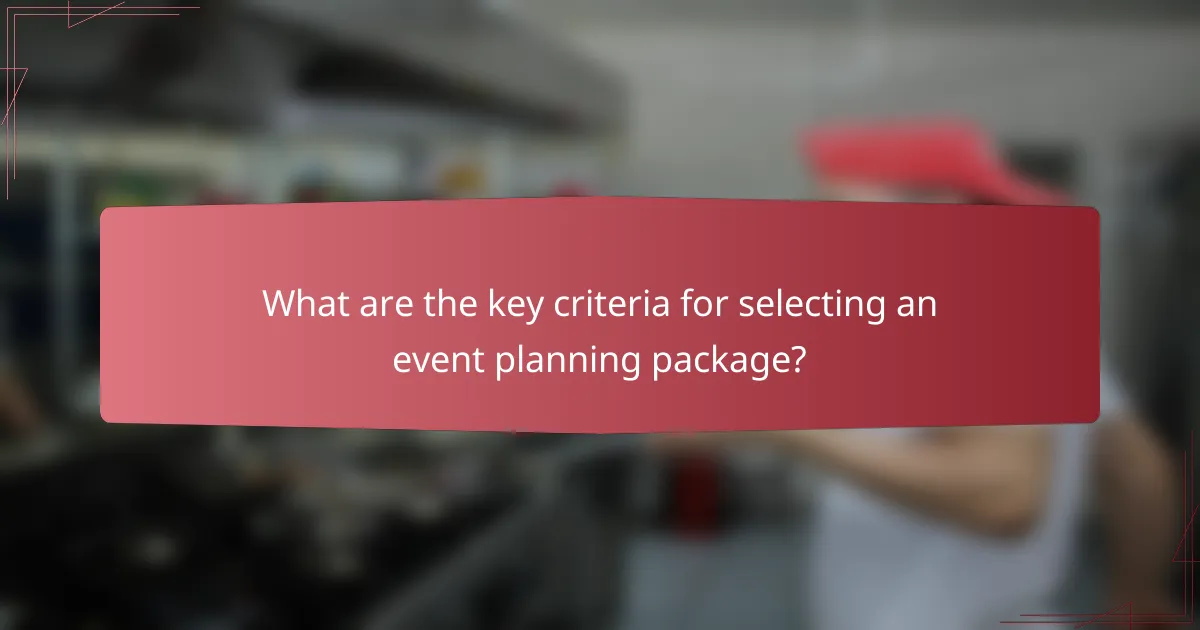
What are the key criteria for selecting an event planning package?
When selecting an event planning package, key criteria include budget considerations, service area coverage, timeline adherence, flexibility, and client feedback. These factors help ensure that the chosen package aligns with your specific event needs and expectations.
Budget considerations
Budget is a primary factor in choosing an event planning package, as it determines the scope of services you can afford. Packages typically range from a few hundred to several thousand dollars, depending on the complexity and scale of the event.
When assessing your budget, consider not only the package price but also any additional costs such as venue rentals, catering, and entertainment. It’s advisable to set a clear budget range and prioritize essential services to avoid overspending.
Service area coverage
Service area coverage refers to the geographical regions where the event planning package is available. Some planners may only operate within specific cities or states, while others might offer nationwide or international services.
To ensure your event is well-supported, check if the planner has experience in your desired location. This can affect vendor availability, local regulations, and logistical considerations, which are crucial for a successful event.
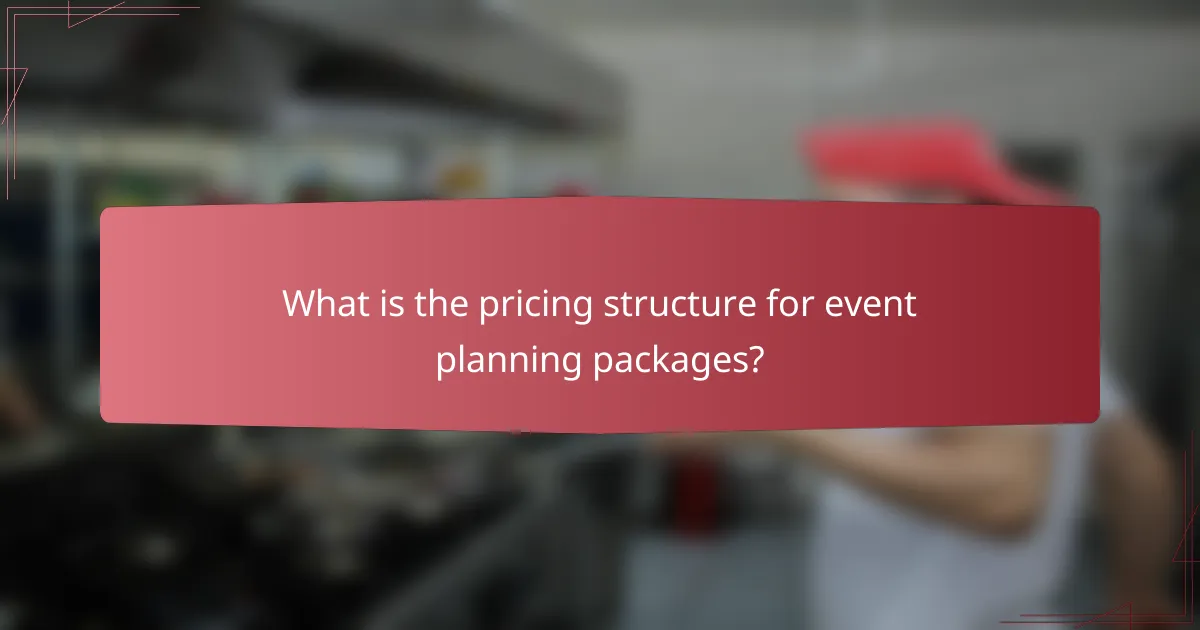
What is the pricing structure for event planning packages?
The pricing structure for event planning packages typically includes a flat fee or a percentage of the overall budget. Understanding these options helps clients choose the best fit for their needs and ensures transparency in costs.
Flat fee vs. percentage of budget
A flat fee structure means clients pay a set amount for the event planning services, regardless of the total budget. This can be beneficial for clients who prefer predictable costs and want to avoid surprises.
On the other hand, a percentage of budget model charges clients a fee based on a percentage of the total event budget, often ranging from 10% to 20%. This method aligns the planner’s incentives with the client’s budget, as the planner may work harder to maximize value within the set budget.
Additional costs for extra services
Clients should be aware that additional costs may arise for extra services not included in the initial package. Common extras can include specialized decor, additional staff, or premium vendor services.
To avoid unexpected expenses, it’s wise to discuss potential add-ons during the planning phase. Requesting a detailed list of services and their associated costs can help manage the overall budget effectively.
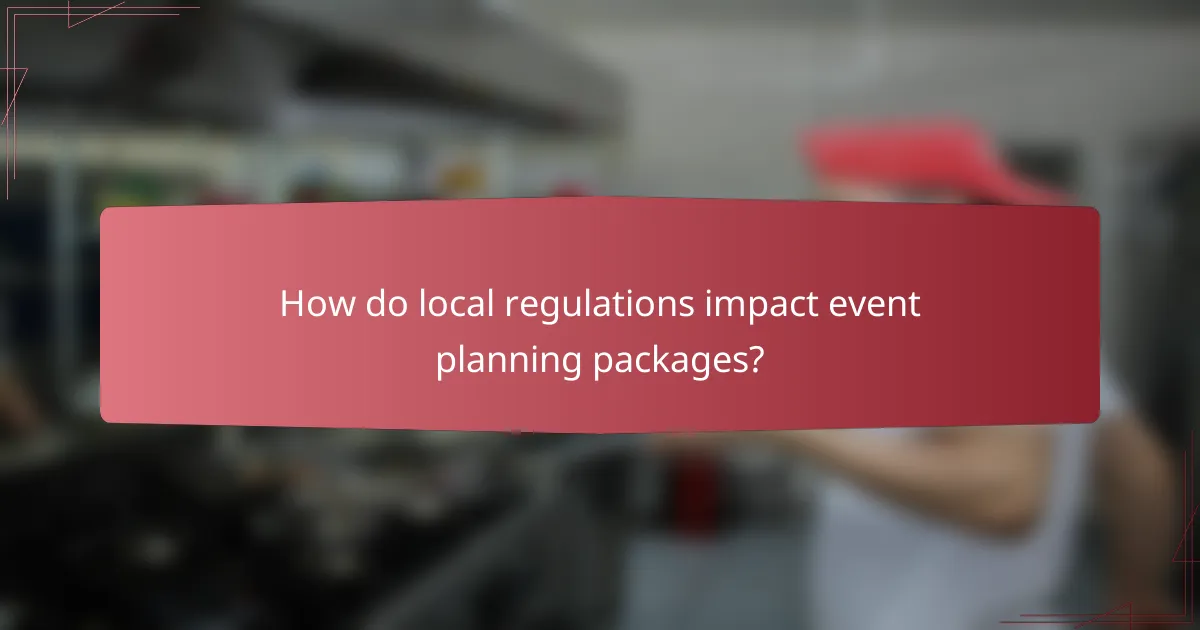
How do local regulations impact event planning packages?
Local regulations significantly influence event planning packages by dictating what is permissible in terms of venue selection, permits, and safety standards. Understanding these regulations is crucial for ensuring compliance and avoiding potential fines or disruptions during the event.
Timeline adherence
Timeline adherence in event planning is often affected by local regulations, which may impose specific deadlines for permit applications and approvals. Planners should account for these timelines when creating schedules to ensure all necessary legal requirements are met before the event date.
For instance, some cities require permits to be submitted at least 30 days in advance, while others may have shorter or longer periods. It’s essential to check local guidelines to avoid last-minute complications that could derail the event.
Flexibility
Flexibility in event planning can be constrained by local regulations, which may limit changes to venue arrangements or guest capacities. Understanding these limitations allows planners to create adaptable plans that remain compliant with local laws.
For example, if a venue’s capacity is capped by local fire codes, planners should have contingency plans for accommodating guests within those limits. This might include options for virtual attendance or alternative venues that can handle larger groups.
Client feedback
Client feedback is vital in shaping event planning packages, especially when local regulations impact the client’s vision. Planners should actively seek input on how regulations affect the event and adjust packages accordingly to meet client expectations.
Encouraging open communication about regulatory constraints can lead to innovative solutions that satisfy both legal requirements and client desires. For example, if a client wants a large outdoor gathering, discussing local noise ordinances and potential permits upfront can help in crafting a feasible plan.
